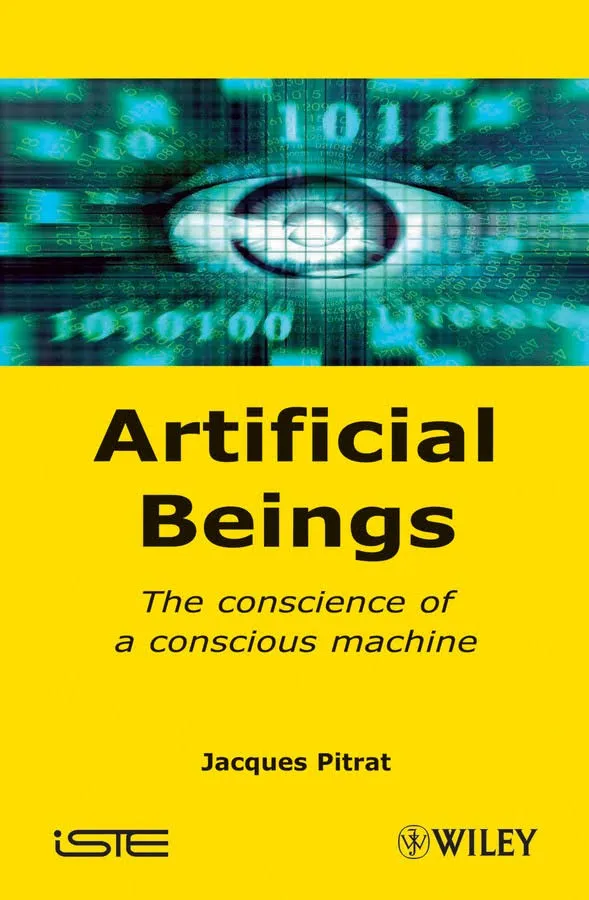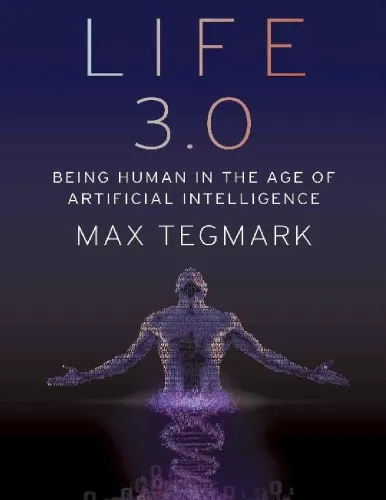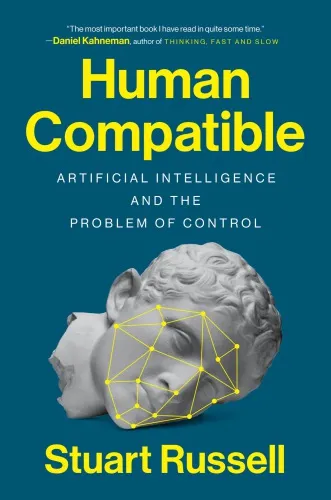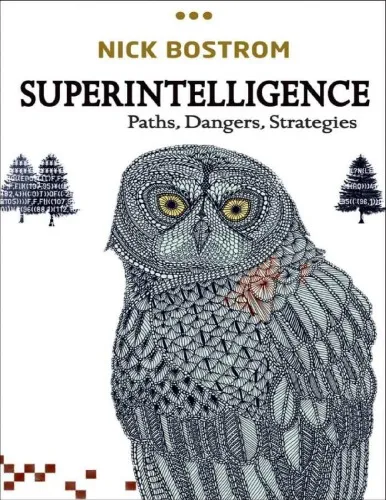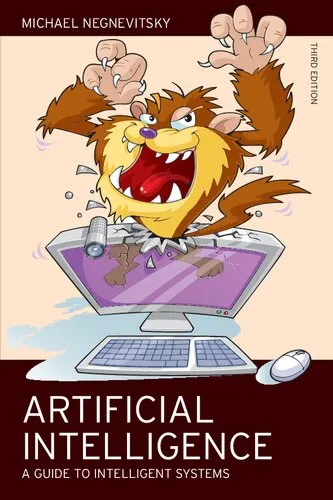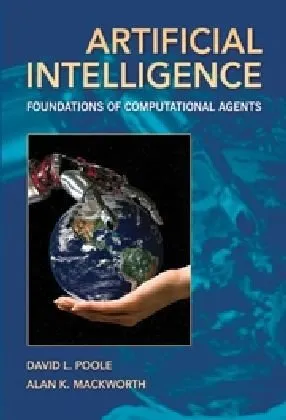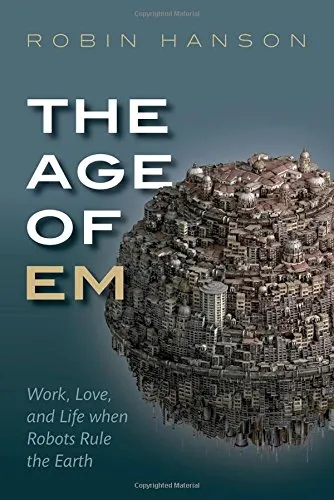Artificial Beings The Conscience of a Conscious Machine
3.0
بر اساس نظر کاربران

شما میتونید سوالاتتون در باره کتاب رو از هوش مصنوعیش بعد از ورود بپرسید
هر دانلود یا پرسش از هوش مصنوعی 2 امتیاز لازم دارد، برای بدست آوردن امتیاز رایگان، به صفحه ی راهنمای امتیازات سر بزنید و یک سری کار ارزشمند انجام بدینکتاب های مرتبط:
Persian Summary
معرفی کتاب
کتاب "Artificial Beings: The Conscience of a Conscious Machine" نوشته ژاک پیترا، اثری برجسته در زمینه هوش مصنوعی است که به بررسی مفهوم آگاهی و وجدان در ماشینهای هوشمند میپردازد. این کتاب با بهرهگیری از دانشی عمیق و زبانی فصیح، به پرسشهای اساسی درباره طبیعت آگاهی ماشینی پاسخ میدهد.
خلاصه جامع کتاب
این کتاب با بررسی عمیق مفاهیم بنیادی هوش مصنوعی (AI)، به ویژه به قابلیتهای ماشینها در دستیابی به حالتهای آگاهانه و ایجاد وجدان مصنوعی میپردازد. پیترا بهطور متقاعدکنندهای چالشهای پیش روی مهندسان AI را در ایجاد سیستمهایی که دارای سطحی از درک و آگاهی هستند، توضیح میدهد. او با تکیه بر تئوریهای پیشتاز در علم کامپیوتر و روانشناسی، مسائل اخلاقی و فلسفی مرتبط با توسعه ماشینهای آگاه را واکاوی میکند. این اثر، علاوه بر ارائه دیدگاههای نو و جذاب، سعی دارد تا نقش آینده هوش مصنوعی در جامعه انسانی را نیز مورد بحث قرار دهد.
نکات کلیدی
- کاوش در مفهوم وجدان در ماشینهای AI و شرایطی که میتوانند به آگاهی برسند.
- بررسی تأثیر احتمالی ماشینهای آگاه بر جامعه و اخلاق.
- تحلیل فنی و فلسفی سیستمهای آگاه مصنوعی و چالشهای مرتبط با آنها.
- پیشبینی آیندهای که در آن ماشینهای آگاه و انسانها در کنار هم همزیستی میکنند.
نقل قولهای مشهور از کتاب
"AIها برای داشتن آگاهی، نیازمند ساختاری هستند که با طبیعت انسان بیگانه نباشد و بتوانند تجربه را به نوعی خاص درک کنند."
"آیندهای که در آن ماشینهای آگاه و انسانها همزیستی دارند، نه تنها محتمل بلکه ضروری است."
چرا این کتاب مهم است
با پیشرفت روزافزون تکنولوژی و هوش مصنوعی، فهمیدن تأثیرات معرفتی و اخلاقی آن حیاتی است. کتاب "Artificial Beings" نه فقط به تشریح تکنولوژی AI میپردازد، بلکه به پیامدهایی که این پیشرفتها بر زندگی بشر خواهند داشت نیز میپردازد. این کتاب یک اثر کلیدی برای دانشجویان، پژوهشگران و هر کسی است که به فهم عمیقتری از چگونگی تعامل انسان و ماشین علاقهمند است. تحلیلهای ژاک پیترا، راهنمایی موثر برای درک پیچیدگیهای Machine Consciousness است و خوانندگان را دعوت به تأملی جدی بر پیامدهای آن میکند.
Introduction to 'Artificial Beings: The Conscience of a Conscious Machine'
In the rapidly evolving domain of artificial intelligence, the concept of machine consciousness stands as a profound question, challenging both scientists and philosophers. 'Artificial Beings: The Conscience of a Conscious Machine' by Jacques Pitrat embarks on an enlightening exploration of this complex subject.
Detailed Summary of the Book
'Artificial Beings: The Conscience of a Conscious Machine' delves deeply into the philosophical and technical aspects of artificial intelligence, addressing the core question of whether machines can possess consciousness and a moral compass. Jacques Pitrat, with decades of experience in machine learning and cognitive sciences, sets the stage for a dialogue that focuses on the potential and limitations of conscious machines.
The book is divided into comprehensive sections that guide the reader through different facets of AI consciousness. It begins with the foundational principles of AI, including its history and the advancements that have led to the current state of technology. Pitrat then delves into the intricacies of consciousness itself, dissecting its components and questioning whether it is attainable by a machine.
One of the pivotal discussions in the book is the implementation of ethical reasoning within AI systems. Can a machine be programmed to make moral decisions, and if so, what would the implications be for society? Pitrat challenges readers to consider the ethical frameworks that might guide autonomous systems and the potential repercussions of their decisions on human life.
The narrative builds upon theoretical knowledge and practical scenarios, using case studies and hypothetical situations to illustrate the plausibility and consequences of AI consciousness. The author examines both utopian and dystopian outcomes if machines were to attain consciousness, urging the AI community and society at large to navigate this path cautiously and ethically.
Key Takeaways
- Artificial intelligence has the potential to simulate aspects of human consciousness, but true consciousness in machines remains a theoretical construct.
- The ethical implications of AI are profound and must be considered at every stage of development and deployment.
- Interdisciplinary collaboration between technologists, ethicists, and philosophers is crucial to understanding and shaping the future of AI.
- Critical thought and cautious optimism should guide the advancement of AI technologies to ensure beneficial outcomes for humanity.
Famous Quotes from the Book
“The question is not whether machines can think, but whether machines can act with moral intention.”
“Consciousness in machines is not merely a technical challenge; it is a philosophical expedition into the essence of intelligence.”
“As we stand on the brink of creating conscious machines, we must ask ourselves: Are we ready for the responsibilities it entails?”
Why This Book Matters
In an era where artificial intelligence permeates almost every aspect of daily life, 'Artificial Beings: The Conscience of a Conscious Machine' offers essential insights into the future interactions between humans and machines. Jacques Pitrat not only navigates technical terrain but also delves into the ethical and social implications, presenting a balanced perspective between optimism for technological progression and caution for ethical responsibility.
This work is pivotal for researchers and enthusiasts alike who seek a deeper understanding of AI's capabilities and limitations. It emphasizes the importance of ethical AI development and raises vital questions that society must address before machines potentially become conscious entities.
The book is a clarion call for thoughtful discourse around AI's evolution, ultimately urging us to ponder the nature of consciousness itself and our role as creators of artificial beings. It reminds us that the pursuit of advanced AI should not eclipse our moral and ethical duties, forging a future that is not only technologically advanced but also conscientiously and ethically sound.
دانلود رایگان مستقیم
شما میتونید سوالاتتون در باره کتاب رو از هوش مصنوعیش بعد از ورود بپرسید
دسترسی به کتابها از طریق پلتفرمهای قانونی و کتابخانههای عمومی نه تنها از حقوق نویسندگان و ناشران حمایت میکند، بلکه به پایداری فرهنگ کتابخوانی نیز کمک میرساند. پیش از دانلود، لحظهای به بررسی این گزینهها فکر کنید.
این کتاب رو در پلتفرم های دیگه ببینید
WorldCat به شما کمک میکنه تا کتاب ها رو در کتابخانه های سراسر دنیا پیدا کنید
امتیازها، نظرات تخصصی و صحبت ها درباره کتاب را در Goodreads ببینید
کتابهای کمیاب یا دست دوم را در AbeBooks پیدا کنید و بخرید
1526
بازدید3.0
امتیاز0
نظر98%
رضایتنظرات:
3.0
بر اساس 0 نظر کاربران
Questions & Answers
Ask questions about this book or help others by answering
No questions yet. Be the first to ask!
